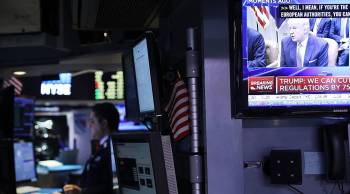Social media and the stock markets after that one AP tweet
Social media and the stock markets after that one AP tweet
The Commodity Futures Trading Commission (CFTC) is holding a meeting with high frequency traders in Washington today. On the agenda: Last week’s Twitter-generated flash crash. Hackers broke into the AP’s twitter account and reported false explosions at the White House. The stock market temporarily plunged.
Combine the flood of instant information — often unverified — on social media, with automated trading programs that buy and sell on that information in microseconds, and you get the potential for a big mess.
“I think that regulators need to take a step back [and] see how technology is impacting markets,” says CFTC commissioner Bart Chilton.
Concern about the impact of social media on the markets has been growing. The SEC recently said companies can share financial information on Twitter and Facebook, as long as they tell investors where to find it.
Social media isn’t the problem, says James Angel, visiting associate professor at the Wharton School at the University of Pennsylvania.
“It’s the availability of instant information that is the real risk here,” he says. “It’s just one more thing in the modern electronic world that can go haywire.”
Last week, the market worked as it was supposed to, Angel says, and quickly corrected when the news turned out to be false.
There’s a lot happening in the world. Through it all, Marketplace is here for you.
You rely on Marketplace to break down the world’s events and tell you how it affects you in a fact-based, approachable way. We rely on your financial support to keep making that possible.
Your donation today powers the independent journalism that you rely on. For just $5/month, you can help sustain Marketplace so we can keep reporting on the things that matter to you.


















